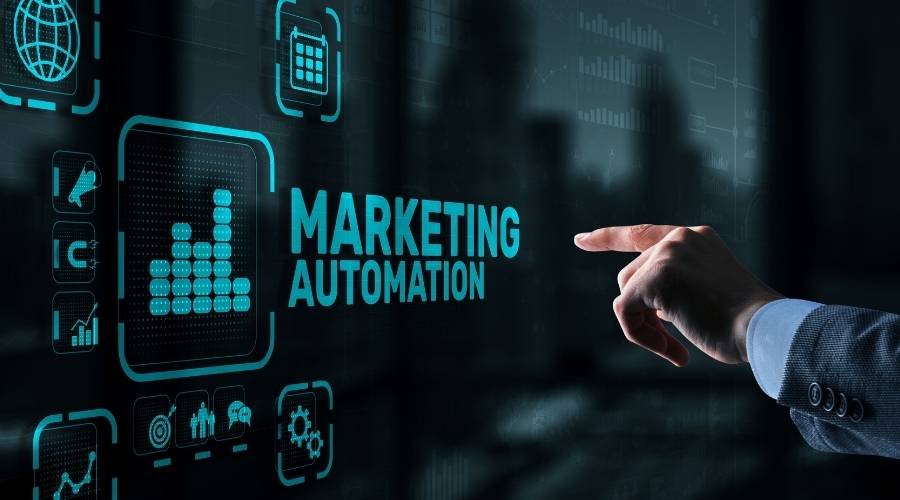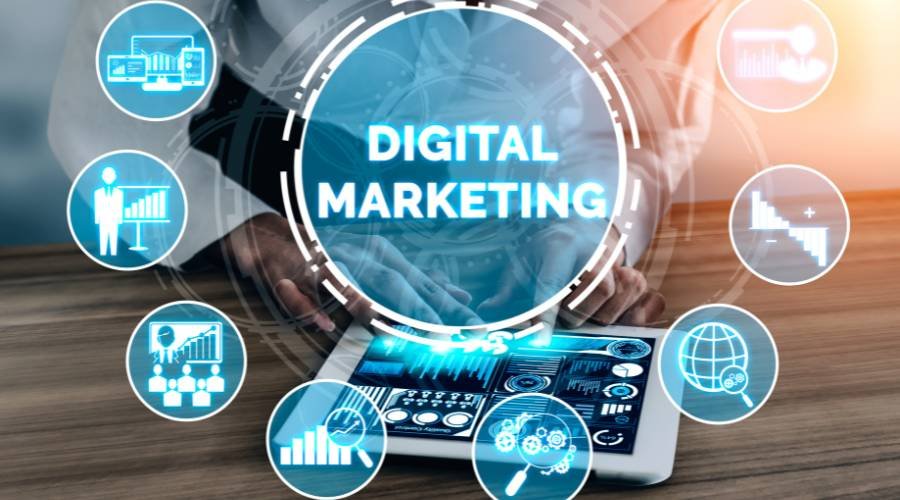Marketing automation refers to the technology that allows businesses to streamline, automate, and measure marketing tasks and workflows. In the Australian market, marketing automation has become increasingly relevant for service-based businesses seeking to enhance efficiency and customer engagement. This technology empowers businesses to save time on repetitive tasks while ensuring consistent and personalized communication with clients.
Key takeaway: This article will explore how service-based businesses can leverage marketing automation workflows to streamline their processes, enhance customer engagement, and drive growth. For instance, by integrating expert content strategy into their marketing automation, businesses can stand out online and drive growth through improved SEO and content marketing services. Additionally, adopting tailored digital marketing strategies in Brisbane can further enhance their online presence and customer engagement.

Understanding Marketing Automation Workflows
Marketing automation workflows are structured sequences of automated tasks designed to streamline various business processes. Service-based businesses benefit from these workflows by efficiently managing repetitive tasks, enhancing customer engagement, and optimizing lead generation strategies.
Key Components of Marketing Automation Workflows
1. Workflow Automation
Automated workflows simplify complex processes by triggering specific actions based on predefined rules or user behaviors. For example, an email campaign can be automatically initiated when a potential client signs up for a newsletter. This ensures timely and relevant communication without manual intervention.
2. Customer Onboarding
Effective customer onboarding is crucial for service-based businesses. Automation can guide new clients through the onboarding process, providing them with necessary information and resources at each stage. This helps in creating a seamless and positive experience, increasing customer satisfaction and retention.
3. Lead Generation
Generating leads is vital for business growth. Automated workflows can identify potential leads through various channels such as social media, email campaigns, and website interactions. By scoring and segmenting these leads based on their engagement levels, businesses can prioritize follow-ups and tailor marketing efforts to convert leads into loyal customers.
Importance of Marketing Automation Workflows
Service-based businesses can gain several advantages by implementing marketing automation workflows:
- Efficiency: By automating repetitive tasks, employees can focus on more strategic activities that require human intervention.
- Consistency: Ensures uniformity in communication and processes, enhancing the professional image of the business.
- Personalization: Tailors interactions based on individual client needs and behaviors, fostering stronger relationships and higher conversion rates.
Understanding these components allows service-based businesses to harness the power of marketing automation workflows effectively, paving the way for enhanced productivity and growth.
Benefits of Implementing Marketing Automation Workflows
Automation is essential for service-based businesses to operate efficiently. By replacing repetitive manual tasks with automated systems, businesses can free up time and resources to focus on strategy, building client relationships, and pursuing growth opportunities.
1. Increased Productivity Through Automation
- Automated workflows handle routine communications, appointment scheduling, invoicing, and follow-ups without manual intervention.
- Teams gain back valuable hours previously lost to admin work, enabling them to focus on higher-value activities such as nurturing leads or refining service offerings.
- For example, automatic reminders for appointments reduce no-shows and eliminate the need for manual calls or emails.
2. Enhanced Customer Engagement with Timely and Relevant Communication
- Automation ensures clients receive information exactly when they need it—welcome emails upon sign-up, appointment confirmations within seconds, satisfaction surveys post-service.
- Responsive communication builds trust and demonstrates professionalism, which is crucial in competitive Australian markets.
- Consistent touchpoints throughout the customer journey foster long-term loyalty and increase the likelihood of referrals.
3. Personalized Marketing Efforts Tailored to Individual Clients
- Segmenting audiences based on behavior or preferences allows businesses to deliver highly relevant content.
- Automated marketing platforms dynamically adapt messages depending on a client’s stage in the buying cycle or specific interests—think of tailored offers for repeat customers versus educational content for new leads.
- Personalization at scale transforms generic outreach into meaningful interactions that drive engagement and conversions.
Service-based businesses leveraging these benefits consistently outperform competitors who rely solely on manual processes. As expectations for fast, personalized experiences rise across industries, automation becomes a vital differentiator.
A strategic approach to automation not only streamlines operations but also lays the foundation for scalable growth as business demands evolve. This includes areas like social media, where mastering automation can boost marketing efficiency while maintaining authenticity and real connections with clients.
Examples of Effective Automated Workflows for Service Businesses
Service-based businesses in Australia are using marketing automation to change how they communicate with potential and current clients. By setting up specific workflows for customer service, sales, and marketing, companies can make processes smoother across different departments.
Customer Service Workflows: Seamless Case Management
Example: An Australian IT support business uses workflow automation to triage incoming requests, reducing response time by 40% and increasing client retention.
Here are some ways this business has improved its customer service:
- Automated Ticket Routing: When a new support request is submitted via a website form or email, automation assigns the ticket to the appropriate staff member based on availability and expertise.
- Status Updates: Clients automatically receive notifications as their case progresses—improving transparency and satisfaction.
- Feedback Collection: After resolution, an automated survey is sent, gathering valuable insights for continuous improvement.
Sales Workflows: Efficient New Client Onboarding
Example: A Brisbane-based consultancy reduces manual admin by automating onboarding tasks, leading to a 30% faster ramp-up for new clients.
Here are some ways this consultancy has streamlined its sales process:
- Welcome Sequences: Once a lead becomes a client, an onboarding sequence delivers personalised emails containing next steps, documentation links, and contact details for key team members.
- Appointment Scheduling: Automated systems send reminders for discovery calls or meetings, which clients can reschedule with a single click.
- Contract Management: Digital contracts are triggered by workflow rules—clients receive prompts to review and sign electronically.
Marketing Workflows: Lead Generation & Engagement Tracking
Example: An Australian accounting firm employs marketing automation Australia-specific workflows to nurture leads from initial enquiry to booked consultation—freeing up staff hours while boosting conversion rates.
Here are some ways this accounting firm has improved its marketing efforts:
- Lead Nurturing Drip Campaigns: Prospects who download resources from the website enter an automated email series that educates them about services and addresses common objections.
- Engagement Scoring: Automation tools score leads based on interactions (e.g., clicks, opens) so sales teams focus on high-intent prospects.
- Re-engagement Triggers: Inactive contacts receive targeted offers or content to reignite interest.
Streamlined customer service workflows, robust sales workflows, and dynamic marketing workflows allow businesses to deliver consistent experiences at scale.
Implementing Marketing Automation in Australia: Key Considerations

Integrating CRM systems with automated workflows is crucial for seamless data management and enhanced employee interaction. CRM integration ensures that customer information is consistently updated and accessible, allowing teams to collaborate efficiently. This integration minimizes manual data entry, reducing errors and freeing up valuable time for employees to focus on more strategic tasks.
Marketing automation also supports the scalability of operations for service-based businesses in the Australian market. Automated workflows can handle increased volumes of customer interactions without compromising quality. This scalability means that as your business grows, your marketing efforts can expand effortlessly to accommodate new clients and service demands.
Key considerations for implementing marketing automation include:
- Choosing the right CRM: Ensure it integrates well with your existing systems and supports automated workflow capabilities.
- Employee training: Equip staff with the knowledge to utilize CRM-integrated workflows effectively, promoting better collaboration and productivity.
- Monitoring and optimization: Regularly assess workflow performance to identify areas for improvement and ensure they align with business goals.
By focusing on these elements, service-based businesses can leverage marketing automation to enhance operational efficiency, improve customer engagement, and support sustainable growth in a competitive market.
Choosing the Right Marketing Automation Solution for Your Business
Selecting the right marketing automation platform is critical for service-based businesses aiming to maximize efficiency and growth. The Australian market features a range of tools designed to meet various operational needs, with an emphasis on user-friendly implementation.
Top marketing automation platforms in Australia include:
- HubSpot: Known for its robust CRM integration, HubSpot offers prebuilt workflow templates for lead nurturing, client onboarding, and appointment scheduling. Its low-code customization options enable non-technical staff to tailor workflows without heavy IT involvement.
- ActiveCampaign: Favoured by SMEs, ActiveCampaign combines email marketing, CRM, and automation. It provides industry-specific templates and visual workflow builders that simplify campaign creation for busy business owners.
- Zoho CRM: Zoho delivers an ecosystem of automation tools with drag-and-drop workflow designers and prebuilt automation modules—ideal for service businesses needing scalable solutions as they grow.
- Keap (formerly Infusionsoft): Keap excels in managing customer journeys with ready-made templates for follow-ups, reminders, and feedback collection. Its interface allows easy adjustments through low-code logic blocks.
Prebuilt workflow templates help businesses launch proven processes faster while reducing reliance on technical specialists. Low-code customization options empower small teams to adjust automations quickly as service offerings or customer expectations evolve.
However, it’s also essential to consider the integration of AI in your marketing strategy. Implementing AI marketing solutions can significantly boost your ROI by streamlining your strategy while offering unparalleled personalization and efficiency. This could be a game-changer for your business as you navigate through the selection of the right marketing automation platform.
Evaluating platforms based on template availability, ease of customization, and local support ensures your chosen solution aligns with both current needs and long-term business goals.
Conclusion
Leveraging marketing automation workflows offers measurable time savings and enhanced efficiency for service-based businesses in Australia. These workflows streamline essential processes, allowing companies to focus on delivering exceptional service. Balancing automation with personalized customer interactions ensures clients feel valued and engaged.
Service-based businesses that embrace marketing automation can achieve:
- Increased productivity and operational efficiency.
- Enhanced customer engagement through timely and relevant communications.
- Tailored marketing efforts that address individual client needs.
By integrating these automated systems, businesses can scale operations effectively while maintaining a high level of personalized service. Embracing marketing automation is not just about keeping pace with technological advancements but also about fostering strong, lasting relationships with customers.
FAQs (Frequently Asked Questions)
What is marketing automation and why is it important for service-based businesses in Australia?
Marketing automation refers to the use of software and workflows to automate repetitive marketing tasks, enabling service-based businesses in Australia to streamline their processes, enhance customer engagement, and drive growth effectively.
How do marketing automation workflows benefit service-based businesses?
Implementing marketing automation workflows increases efficiency by automating routine tasks, boosts customer engagement through timely and relevant communication, and allows for personalized marketing efforts tailored to individual client needs.
What are some examples of effective automated workflows for service businesses in Australia?
Service-based businesses can utilize automated workflows in various areas such as customer service with case management, sales through new client onboarding processes, and marketing by automating lead generation and engagement tracking.
Why is CRM integration important when implementing marketing automation in Australian service businesses?
Integrating CRM systems with automated workflows ensures seamless data management, improves employee collaboration, and supports scalable operations, which are critical considerations for successful marketing automation implementation in the Australian market.
What features should I look for when choosing a marketing automation solution for my Australian service business?
Look for platforms offering prebuilt workflow templates tailored to different business functions and low-code customization options that allow easy implementation without extensive technical expertise, ensuring the solution fits your unique business needs.
How can marketing automation help balance efficiency with personalized customer interactions?
Marketing automation saves measurable time by automating repetitive tasks while enabling personalized communication strategies that maintain meaningful customer interactions, ensuring service-based businesses in Australia deliver both efficiency and a tailored customer experience.




